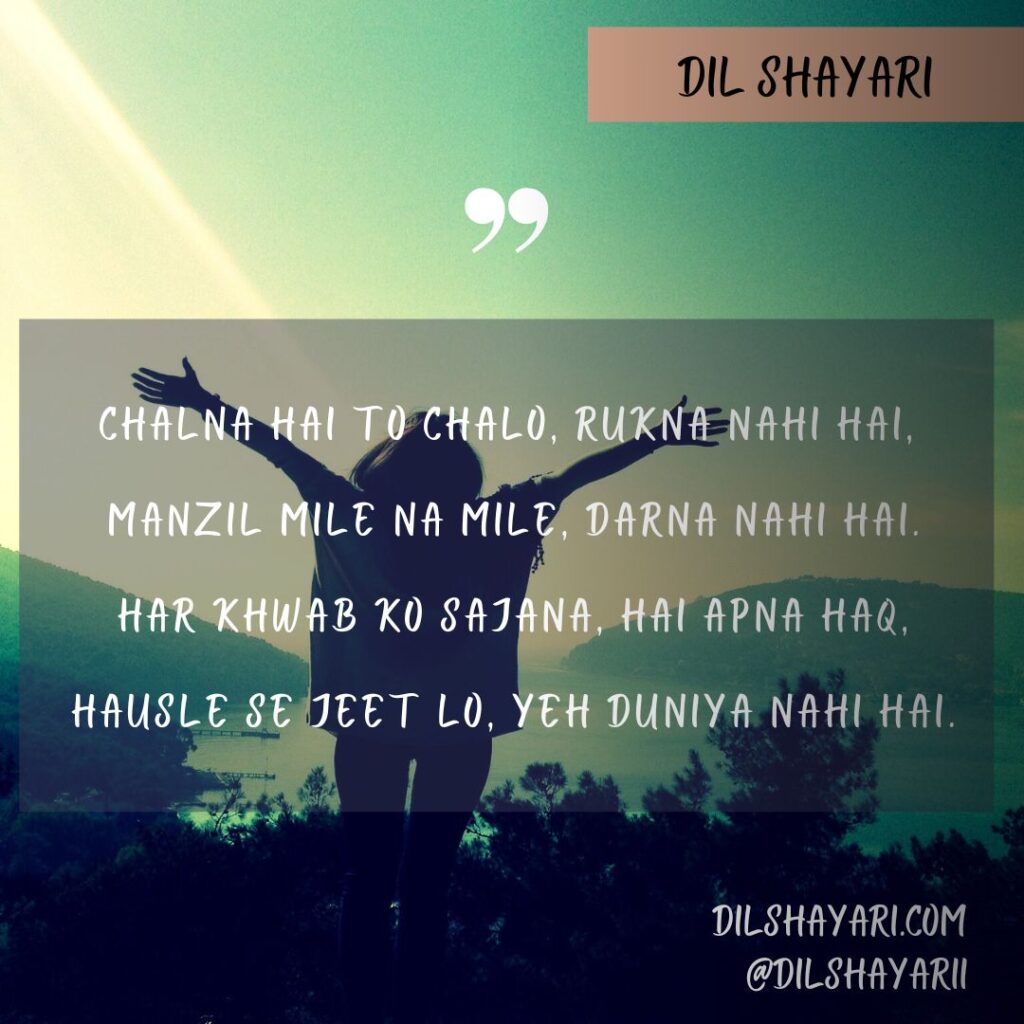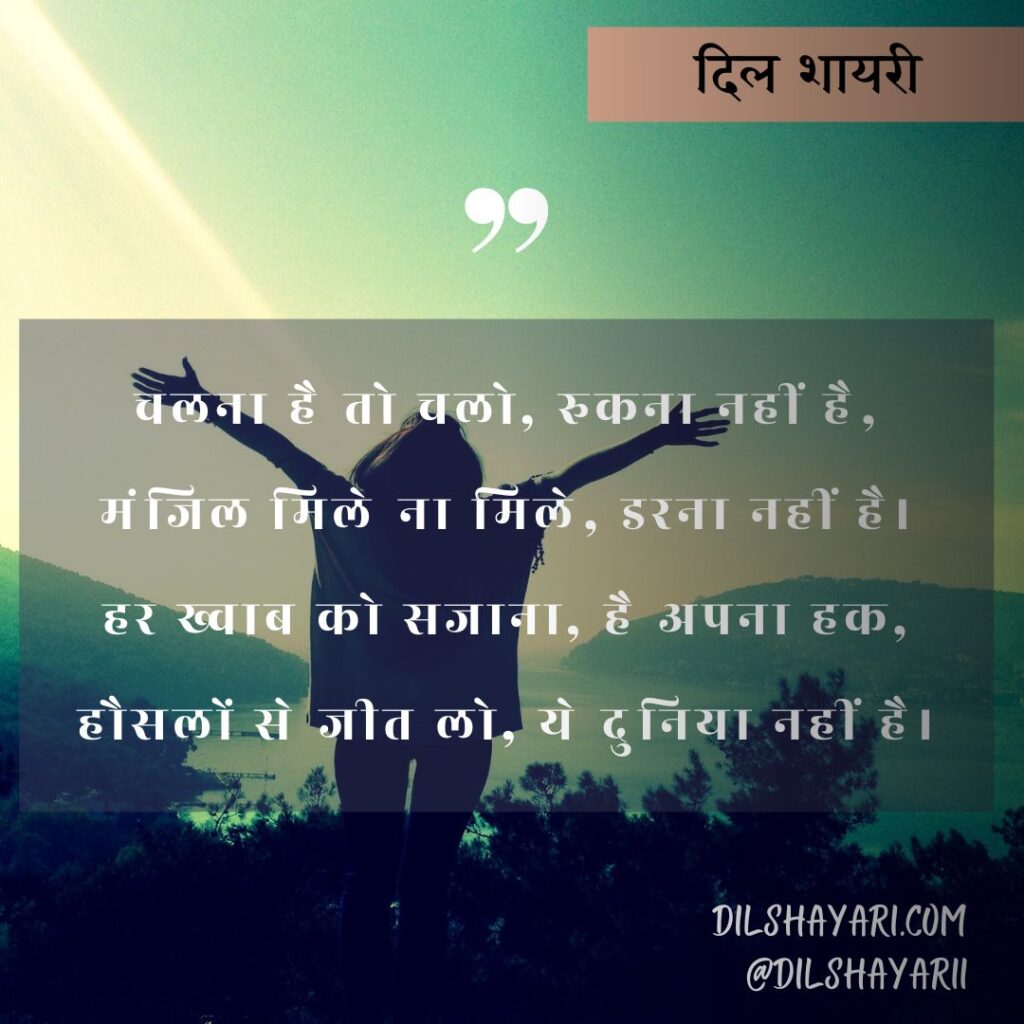
Chalna Hai To Chalo, Rukna Nahi Hai,
Manzil Mile Na Mile, Darna Nahi Hai.
Har Khwab Ko Sajana, Hai Apna Haq,
Hausle Se Jeet Lo, Yeh Duniya Nahi Hai.

चलना है तो चलो, रुकना नहीं है,
मंजिल मिले ना मिले, डरना नहीं है।
हर ख्वाब को सजाना, है अपना हक,
हौसलों से जीत लो, ये दुनिया नहीं है।

If You Want To Go Then Go, Don’t Stop.
Don’t Be Afraid Whether You Reach Your Destination Or Not.
Decorating Every Dream Is Your Right,
Win With Courage, This Is Not The World.
Chalna Hai To Chalo, Rukna Nahi Hai,
Manzil Mile Na Mile, Darna Nahi Hai.
Har Khwab Ko Sajana, Hai Apna Haq,
Hausle Se Jeet Lo, Yeh Duniya Nahi Hai.
Chalna Hai To Chalo, Rukna Nahi Hai, Manzil Mile Na Mile, Darna Nahi Hai. Har Khwab Ko Sajana, Hai Apna Haq, Hausle Se Jeet Lo, Yeh Duniya Nahi Hai.
Ye panktiyan ek gahan aur prernaadayi sandesh deti hain jo zindagi ke safar aur lakshya ki khoj ko samjhati hain. Isme vyakti ke jivan mein aage badhne ki ichha, sahas, sapno ko apnane aur duniya ko apni sharto par jeetne ki baat ki gayi hai. Isse hum apni jindagi mein anek pehluon se jod kar dekh sakte hain, chaahe wo vyakti ke vyaktigat lakshya ho, manasik drishtikon ho, ya samajik samasyaayein.
“Chalna Hai To Chalo, Rukna Nahi Hai”
Is pehle bhaag ka arth hai ki jeevan ek nirantar yatra hai, jisme hume hamesha aage badhte rehna hai. Rukna kabhi ek vikalp nahi hota, chahe kitni bhi mushkilein aayein. Is zindagi mein rukawat ek prakriti ka hissa hai, lekin yeh hamesha yaad rakhna chahiye ki rukawat ek ant nahi, balki ek rasta hai aagey ke liye.
Yeh pankti batati hai ki agar hum aage chal rahe hain to safalta ya manzil ka sochne se pehle chalna zaroori hai. Yatra ka mahatva manzil se zyada hai, kyunki yahi yatra hume seekhne, badhne aur apne lakshya ke kareeb pahunchane mein madad karti hai. Yeh hume kshama shakti aur dheray ki baat bhi samjhati hai, ki chahe samay lage ya kathinaiyan aayein, lekin hume kabhi rukna nahi chahiye.
“Manzil Mile Na Mile, Darna Nahi Hai”
Is pankti mein zindagi ke safar mein dar ke mahatv ko kam karne ka sandesh hai. Kayi baar hum apne sapnon aur apni manzil ke bare mein sochte hain, lekin is asafalta ke dar se ki hum manzil tak nahi pahunch payenge, hum kadam uthana chhod dete hain. Lekin yeh pankti keh rahi hai ki manzil mile ya na mile, hume darna nahi hai. Dar hamesha hume apne sapno se door karta hai, isliye hume apne mann ke dar ko jeetne ki kshamata rakhni chahiye.
Zindagi ka safar hamesha asaan nahi hota, aur kabhi-kabhi manzil milne mein samay lag sakta hai. Lekin agar hum asafalta ke dar se apna safar rok denge, to hum kabhi apni poori kshamata nahi jaan payenge. Yeh pankti hume prerna deti hai ki hamesha apne hauslon ko banaye rakhein, bina dar ke aage badhein aur jo karna hai us par viswas karein.
“Har Khwab Ko Sajana, Hai Apna Haq”
Sapne dekhna aur un sapnon ko sajana, yah ek vyakti ka janmasiddh adhikar hai. Hum sab apne jeevan mein sapne dekhte hain – kuch bade, kuch chhote. Sapne hamesha ek vyakti ko prerna dete hain aagey badhne ke liye, apne astitva ko kuch alag tareeke se jeene ke liye.
Is pankti mein kaha gaya hai ki apne sapnon ko sajana yaani un sapnon ko hakikat mein badalne ki koshish karna har vyakti ka haq hai. Apne sapnon ke liye ladna aur apne lakshya ki prapti ke liye mehnat karna koi galat baat nahi hai. Har vyakti ko yeh haq hai ki wo apne sapne dekhe aur unke liye puri shiddat se mehnat kare.
“Hausle Se Jeet Lo, Yeh Duniya Nahi Hai”
Duniya kabhi asaan nahi hoti. Yeh hamesha kisi na kisi roop mein humare samne kathinaiyaan khadi karti hai. Lekin yeh duniya tab tak hume hara nahi sakti jab tak hum apne hauslon ko mazboot rakhe. Is pankti ka arth hai ki is duniya mein jeetne ke liye sirf shakti ya samarthya ki zarurat nahi hai, balki hauslon ki bhi utni hi mahatvta hoti hai.
Hausla, yaani mann ki dridhta, ek aisa shastra hai jo duniya ke sabse kathin musibaton ko bhi hara sakta hai. Jo vyakti apne hauslon ko mazboot rakhta hai, wo duniya ki sabhi chunautiyon ka samna kar sakta hai. Hausla hamesha vyakti ke andar se aata hai, aur yeh ek aisa bal hai jo kisi bhi bahari shakti se badhkar hota hai.
Vyakhya
Agar hum in saari panktiyon ka samuhik arth dekhein, to yeh ek prerna ka sandesh hai, jo hume zindagi mein hamesha aage badhne ki, dar se door rehne ki aur apne sapnon ke liye ladne ki shiksha deti hai. Yeh panktiyan ek vyakti ke jeevan mein sahas aur hausle ke mahatv ko vistar se batati hain. Zindagi ek yatra hai jisme kathinaiyan aati hain, lekin hamesha hausla aur vishwas se hum in kathinaiyon ka samna kar sakte hain.
Isme yeh bhi kaha gaya hai ki yadi hum sapne dekhte hain to un sapnon ke liye ladna aur mehnat karna hamara adhikar hai. Duniya hamesha hume neeche kheenchne ka prayas karegi, lekin agar hum apne hauslon ko banaye rakhein to duniya hume kabhi hara nahi sakti.
Panktiyon mein jo sandesh hai, wo vyakti ke jeevan ke har pehlu par lagu hota hai. Chahe vyakti apne vyaktigat jeevan mein kathinaiyon ka samna kar raha ho, apni padhai ya career mein chunautiyon ka samna kar raha ho, ya samaj mein apni pehchaan banane ki koshish kar raha ho, in sabhi sthitiyon mein yeh panktiyan ek roshni ki tarah kaam karti hain.
Saar
Is rachna ka mool sandesh yeh hai ki jeevan mein kabhi bhi kathinaiyon se ghabrana nahi chahiye. Manzil kitni bhi door ho, agar hum apne sapno ko apnayein, apne hauslon ko mazboot rakhein aur dar se door rahkar aage badhein, to hum apne jeevan ko safalta ki or le ja sakte hain.
Is duniya ko jeetne ke liye sabse badi taqat vyakti ka hausla hota hai, aur agar hum apne hauslon ko mazboot rakhein, to duniya ki koi bhi takat hume hara nahi sakti.
Chalna Hai To Chalo, Rukna Nahi Hai : Introduction
The couplet “Chalna Hai To Chalo, Rukna Nahi Hai, Manzil Mile Na Mile, Darna Nahi Hai” serves as an inspirational anthem, urging individuals to keep moving forward in the face of challenges. These lines encapsulate a philosophy of resilience, ambition, and the relentless pursuit of dreams, regardless of the obstacles that may arise.
Meaning of the Lines
Chalna Hai To Chalo, Rukna Nahi Hai:
This line is a call to action, emphasizing the importance of progress and perseverance. The phrase suggests that if you have the determination to move forward, you should do so without hesitation. Stagnation is often viewed as a setback, while continuous movement signifies growth and evolution.
Manzil Mile Na Mile, Darna Nahi Hai:
Here, the speaker acknowledges that the ultimate goal (manzil) may not always be reached. However, this should not instill fear or doubt. Instead, the focus should remain on the journey itself. The idea is to embrace the process of striving rather than fixating solely on the end result.
Har Khwab Ko Sajana, Hai Apna Haq:
This line emphasizes the right to dream and to nurture those dreams. It encourages individuals to envision their aspirations vividly and work towards making them a reality. The act of “sajana” or decorating one’s dreams signifies the importance of imagination and creativity in the journey of life.
Hausle Se Jeet Lo, Yeh Duniya Nahi Hai:
The concluding line brings forth the notion that with determination (hausle), one can conquer any challenge that the world presents. It suggests that the world, with all its complexities and hardships, is not a barrier but a space to be navigated with courage and resolve.
Themes and Insights
1. Resilience
The overarching theme of resilience is prominent throughout these lines. Life is inherently fraught with difficulties, and the ability to bounce back from setbacks is crucial. By encouraging relentless movement, the message is clear: resilience is not just about enduring hardships, but also about actively overcoming them.
2. The Value of the Journey
Another significant insight is the value placed on the journey rather than the destination. Often, people become so consumed with their goals that they forget to appreciate the experiences that shape them along the way. This couplet serves as a reminder that every step taken is a vital part of personal growth.
3. Empowerment through Dreams
The emphasis on dreaming and decorating those dreams underscores the importance of self-empowerment. Dreams are not just fantasies; they are the blueprints of what can be achieved. By nurturing these dreams, individuals cultivate hope and purpose in their lives.
4. Courage Against Fear
Fear is a universal experience, particularly when pursuing ambitions. This couplet boldly states that fear should not deter action. Instead, courage is highlighted as an essential quality that enables individuals to navigate life’s uncertainties.
Practical Applications
- Personal Development:
Individuals can reflect on their own lives through the lens of these lines. Setting personal goals, identifying dreams, and taking actionable steps toward them can lead to significant growth. Journaling about aspirations and the journey can help in maintaining focus and motivation. - Facing Challenges:
In moments of difficulty, recalling this couplet can provide encouragement. It serves as a reminder to persist despite the odds. Building a support system that reinforces this mindset can also be beneficial. - Mindset Shift:
Shifting focus from solely outcomes to the value of the process can lead to greater satisfaction and less anxiety. Celebrating small milestones along the way reinforces the idea that every effort counts. - Inspiring Others:
Sharing this philosophy with others can create a ripple effect. Whether through mentoring, teaching, or simply offering support to friends, the message of perseverance and courage can inspire those around us to pursue their dreams fearlessly.
Conclusion
The couplet “Chalna Hai To Chalo, Rukna Nahi Hai, Manzil Mile Na Mile, Darna Nahi Hai” resonates deeply with the human experience. It encapsulates a timeless philosophy of life that emphasizes movement, courage, and the beauty of dreams. In a world filled with uncertainties, these lines encourage us to embrace the journey, pursue our passions, and remain undeterred by the challenges we face. Ultimately, it is this spirit of perseverance that defines our success and fulfillment in life.
